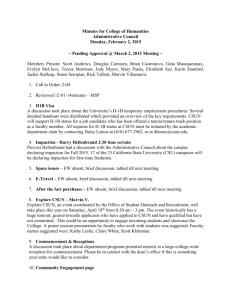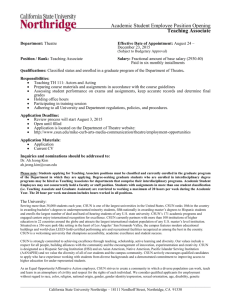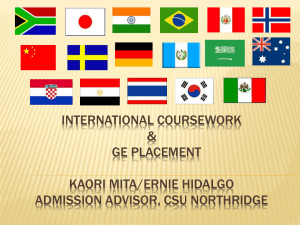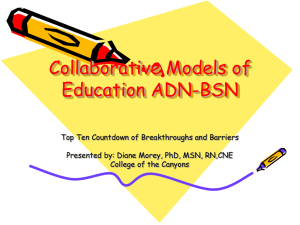Mandatory Meetings
advertisement
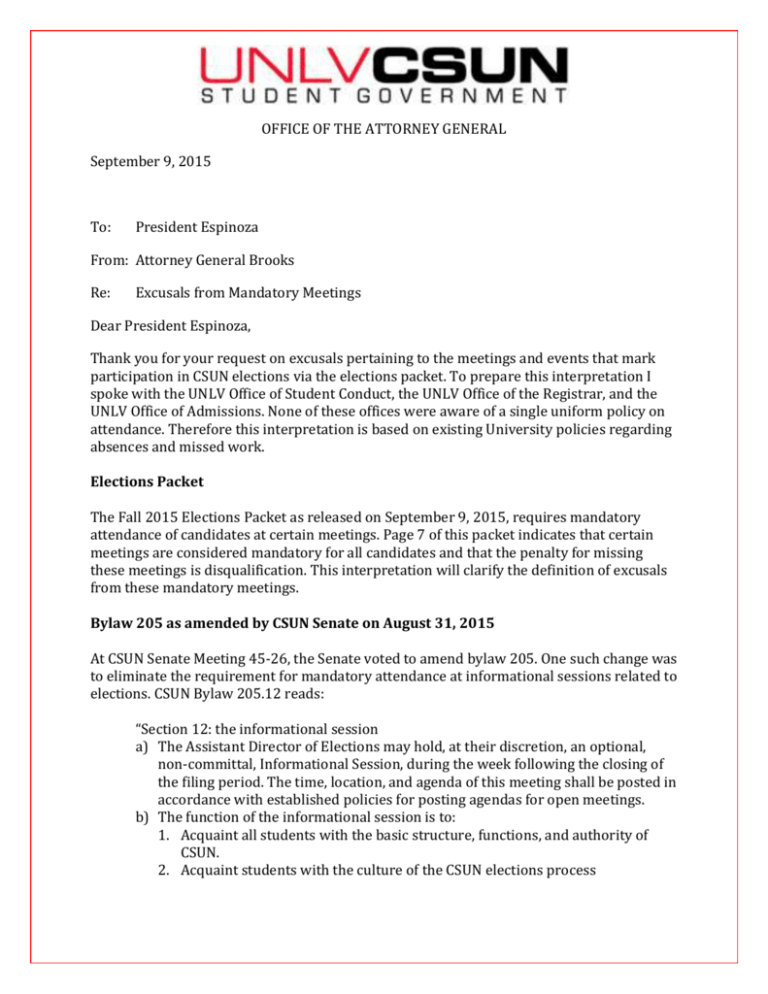
OFFICE OF THE ATTORNEY GENERAL September 9, 2015 To: President Espinoza From: Attorney General Brooks Re: Excusals from Mandatory Meetings Dear President Espinoza, Thank you for your request on excusals pertaining to the meetings and events that mark participation in CSUN elections via the elections packet. To prepare this interpretation I spoke with the UNLV Office of Student Conduct, the UNLV Office of the Registrar, and the UNLV Office of Admissions. None of these offices were aware of a single uniform policy on attendance. Therefore this interpretation is based on existing University policies regarding absences and missed work. Elections Packet The Fall 2015 Elections Packet as released on September 9, 2015, requires mandatory attendance of candidates at certain meetings. Page 7 of this packet indicates that certain meetings are considered mandatory for all candidates and that the penalty for missing these meetings is disqualification. This interpretation will clarify the definition of excusals from these mandatory meetings. Bylaw 205 as amended by CSUN Senate on August 31, 2015 At CSUN Senate Meeting 45-26, the Senate voted to amend bylaw 205. One such change was to eliminate the requirement for mandatory attendance at informational sessions related to elections. CSUN Bylaw 205.12 reads: “Section 12: the informational session a) The Assistant Director of Elections may hold, at their discretion, an optional, non-committal, Informational Session, during the week following the closing of the filing period. The time, location, and agenda of this meeting shall be posted in accordance with established policies for posting agendas for open meetings. b) The function of the informational session is to: 1. Acquaint all students with the basic structure, functions, and authority of CSUN. 2. Acquaint students with the culture of the CSUN elections process 3. Answer any and all questions students may have about CSUN and how to become involved in the organization.” This bylaw clearly removes the mandatory requirement for attendance at informational sessions related to CSUN Elections. The only remaining reference to mandatory meetings in bylaw 205.8.d.1.vii, which reads: “A statement signed by the candidate that he or she is responsible for all information contained in this Chapter, the CSUN Filing Packet, the CSUN Election Rules, and that the candidate will attend mandatory meetings as set forth by the Elections Board.” As the Fall 2015 Elections Packet produced by the Election Board, approved by the Senate, and distributed by the Assistant Director for Elections, mandates attendance at several meetings, this portion of the bylaw provides important context for the question at hand. The question remains: what constitutes an excused absence from these mandatory meetings? For this I turned to official University policy on absences due to extra-curricular activities and catastrophic events. University Undergraduate Catalogue The University of Nevada, Las Vegas, Undergraduate Catalogue Fall 2015-Spring 2016 states: “There are no official absences from any university class. It is the student’s responsibility to consult with the course instructor regarding absences from their class. Students may be dropped from classes for nonattendance during the first week of instruction.” The Undergraduate Catalogue continues: “Class attendance policy: registration in a class obligates the student to be regular and punctual in class attendance. Students who without previous arrangement with the instructor or department fail to attend the first two class meetings of a course that meets multiple times per week or the first meeting of a class that meets one time per week may be dropped from the course. Nonattendance for a web-based course shall be defined as failure to log onto WebCampus or other instructordesigned website within one week of the course start date without previous arrangements with the instructor or department. Nonattendance does not release the student from the responsibility to officially drop any course for which they have enrolled and choose not to complete, nor from financial obligation to pay for the course.” The most current University of Nevada, Las Vegas, Undergraduate Catalogue thus defines attendance only in relation to attendance of classes and not in relation to extra-curricular activities such as participation in UNLV CSUN Student Government. Additionally, the University Undergraduate Catalogue allows for absences based on religious observance: “It is the policy of the Nevada System of Higher Education to be sensitive to the religious obligations of its students. Any student missing class quizzes, examinations, or any other class or lab work because of observance of religious holidays shall be given an opportunity during that semester to make up missed work. The makeup will apply to the religious-holiday absence only. It shall be the responsibility of the student to notify the instructor within the first 14 calendar days of the semester of his or her intention to participate in religious holidays that do not fall on state holidays or periods of class recess. This policy shall not apply in the event that administering the test or examination at an alternate time would impose an undue hardship on the instructor or the university that could not reasonably have been avoided. Any student who is denied a make-up option after appropriately notifying the instructor, shall have the right to appeal that decision through the normal appeal mechanism in place.” However, the University Undergraduate Catalogue also defines “missed work” with relation to extracurricular activities: “Students who represent the University of Nevada, Las Vegas, at any official extracurricular activity shall have the opportunity to make up any assignments or examinations missed as a result of this event. It is the responsibility of the student to provide official written notification to the instructor of the course(s) at the earliest time possible of his or her intention to participate in a university-sponsored event but no less than one week prior to the date of the missed class(es). This policy shall not apply in the event that completing the assignment or administering the examination at an alternate time would impose an undue hardship on the instructor or the university that could reasonably have been avoided. There should be a goodfaith effort by both instructor and student to come to a reasonable solution. When disagreements regarding this policy arise, they can be appealed to the department chair, dean of the college, and the Faculty Senate Academic Standards Committee. For purposes of definition, extra-curricular activities may include, but are not limited to, intercollegiate athletics, band, drama, forensics, recruitment, or any other activity sanctioned by the dean and/or the Executive Vice President and Provost.” This policy makes it clear that the University identifies certain extra-curricular activities as sponsored by the University and makes allowances for the absences accrued by those activities. My interpretation is that CSUN should follow this missed work policy given that we are a part of the University and govern the undergraduate student body. An adaptation of this policy is applicable to the Elections Packet, so that if a candidate could not attend a mandatory meeting due to an extracurricular activity where they represent the University, and they provided appropriate documentation at least one week in advance, then they would not be automatically disqualified from the election. Conclusion It is not in the best interest of CSUN to limit participation from those students who already play leadership roles in representing our University through other University sponsored activities. Therefore, one week advance warning of absence due to intercollegiate athletics, band, drama, forensics, recruitment, and other university sanctioned activities should be considered excused absences for the purposes of the Elections Packet. While there is no existing policy that requires the University to excuse absences on the basis of unexpected catastrophic events such as the death of a family member, severe illness, an automobile accident, or natural disaster, it would follow that these events should be treated similarly and be allowed to be excused as long as proper documentation is submitted in a timely manner. Additionally it would follow that if a candidate has a class scheduled at the same time as the mandatory meeting that the candidate should be excused from the meeting. The Constitution and Bylaws committee would be well served to make this explicit in future iterations of Bylaw 205. Please feel free to contact me if you have any additional questions. Warmest wishes, Sara Beth Brooks UNLV CSUN Attorney General, 2015-2016
